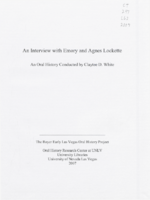Search the Special Collections and Archives Portal
Search Results
Beckley-Richardson, Virginia: video interview and transcript, 2005
Level of Description
File
Archival Collection
<em render="italic">The Story of Classic Las Vegas</em> Oral History Interviews
Pagination
- Previous page ‹‹
- Page 3
Archival Component
Brown, Mahlon, Part 1: video interview and transcript, 2005
Level of Description
File
Archival Collection
<em render="italic">The Story of Classic Las Vegas</em> Oral History Interviews
Pagination
- Previous page ‹‹
- Page 3
Archival Component
Brown, Mahlon, Part 2: video interview and transcript, 2005
Level of Description
File
Archival Collection
<em render="italic">The Story of Classic Las Vegas</em> Oral History Interviews
Pagination
- Previous page ‹‹
- Page 3
Archival Component
Bryan, Richard, Part 1: video interview and transcript, 2005
Level of Description
File
Archival Collection
<em render="italic">The Story of Classic Las Vegas</em> Oral History Interviews
Pagination
- Previous page ‹‹
- Page 3
Archival Component
Bryan, Richard, Part 2: video interview and transcript, 2005
Level of Description
File
Archival Collection
<em render="italic">The Story of Classic Las Vegas</em> Oral History Interviews
Pagination
- Previous page ‹‹
- Page 3
Archival Component
Cashman, James Jr.: video interview and transcript, 2005
Level of Description
File
Archival Collection
<em render="italic">The Story of Classic Las Vegas</em> Oral History Interviews
Pagination
- Previous page ‹‹
- Page 3
Archival Component
Devaux-Oakes, Jenny: video interview and transcript, 2005
Level of Description
File
Archival Collection
<em render="italic">The Story of Classic Las Vegas</em> Oral History Interviews
Pagination
- Previous page ‹‹
- Page 3
Archival Component

Transcript of interview with Emory and Agnes Lockette by Claytee D. White, March 11, 2005
Date
2005-03-11
Archival Collection
Description
Interview with Emory and Agnes Lockette conducted by Claytee D. White on March 11, 2005. The Lockettes were the only African Americans to live in Boulder City during years of racial tension. Agnes taught kindergarten at Westside School, while Emory worked for the Bureau of Reclamation.
Text

Interview with James Arnold Hodges, January 17, 2005
Date
2005-01-17
Archival Collection
Description
Narrator affiliation: Photographic engineer, Edgerton, Germeshausen, and Grier (EG&G)
Text
Wiener, Valerie: video interview and transcript, 2004 to 2005
Level of Description
File
Archival Collection
<em render="italic">The Story of Classic Las Vegas</em> Oral History Interviews
Pagination
- Previous page ‹‹
- Page 3
Archival Component
Pagination
Refine my results
Content Type
Creator or Contributor
Subject
Archival Collection
Digital Project
Resource Type
Year
Material Type
Place
Language
Records Classification
